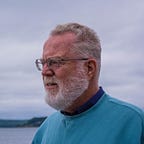158, Memories, 6/15/’21
“Hi, Grandpa. What ya doin’?”
“Just sitting here on the deck looking out at the Bay.”
“What ya lookin at?”
“Memories.”
“Grandpa, you can’t see memories.”
“I can, Punkin. I look out and see the Bay the way
it used to be.”
“Hasn’t the Bay always been this way?”
“No, when I was your age it was a different place altogether.
I would sit here with my grandfather in Adirondack chairs he built and just soak up the Bay.”
The air was so clear you could almost taste it, none of
the diesel smell we have now. Back in the 2020’s you
could see the bald top of Cadillac across the Bay, holding up the sky over Acadia National Park.”
“Where, Grandpa?”
“There to the south, that hazy silhouette.”
“In the early morning you could hear lobstermen talking to each other on their two-way radios. The Bay was full of lobster buoys, each one marking the end of a thick line that your eyes could follow deep into the clear water. At the end was a lobster trap, likely as not with a lobster in it, maybe two or three. My grandfather and I could look out and count 70 or 80 buoys all different colors, catching the early morning sun over a calm Bay. What do you see now?”
“I count … eleven.”
“And birds! Back then the Bay had about 20 pairs of nesting eagles; osprey hunted, Eider ducks spent their winters with us. When I was young it was unusual not to see at least one eagle every day. When was the last time you saw an eagle or heard it scream, Punkin?
I’m not sure I’ve ever seen one, Grandpa.
“They’ve mostly passed us by; moved up the coast to the other side of Gouldsboro.”
“I used to sit out here at night with my grandfather and marvel at the Milky Way. You can’t see it anymore. The diesel fumes and the light pollution have obscured it. Hell, you can’t even see the Big Dipper. It used to pour its blessings onto our cabin; used to feel like you could reach out and touch it.”
“What’s the Big Dipper, grandpa?”
“It’s a group of seven bright stars shaped like a dipper.”
“It’s gone?”
“No, even we can’t extinguish the stars. They’re there, it’s just that we can no longer see them.”
“I remember the quiet of those nights, the loudest quiet I ever heard. It shut me up, I’ll tell you that. I would listen, until it got so cold that I had to go inside and get ready for bed.”
“In the summer over two million people used to come from across the country — no, from around the world — to see this Bay. Believe it or not, there were traffic jams in Ellsworth.”
“Was that a good thing, Grandpa?”
“Well, it was a bit of an inconvenience in the summer, but it meant a lot of good jobs in hotels and restaurants and shops throughout the area. Not many people around here who wouldn’t like to see those traffic jams again.”
Why did it change?
“Because my generation cared more about its own short-term gains than about you and your children. We cared more about money than about the land. We were short-sighted and greedy.”
“You’ve been studying Native Americans in school: did they teach you that the Haudenosaunee felt responsible for preserving the sustainability of their world for seven generations?”
“Seven generations. What would that mean, Grandpa?”
“Let’s count starting with my grandfather, the one I used to sit with on this very spot and watch the Bay: he would be your great, great grandfather; then my father, your great grandfather; then me; then your dad; then you; then your children and finally your grandchildren.”
“That’s a lot!”
“Yes, it is. We have failed the test of the Haudenosaunee; we weren’t able to preserve this once-beautiful Bay for you and your children.”
“We owe you and all your classmates at Sullivan’s Mountain View School an apology. We took that old Bay away from you. Sold it, really, for a handful of magic beans.”
“Magic Beans? Like the story.”
“Yes, instead of a cow, we traded our air, and water, and the natural beauty of this Bay for a pocket full of empty promises.”
“And it’s not as if we didn’t know. We used to have urchins in the Bay, until we over-fished them. When they left the starfish left as well. There used to be schools of mackerel swimming within a stone’s-throw of this shore, but we poisoned the water and fished them to extinction. Same with the scallops. They went the way of the ocean cod and with them another part of the life I had hoped to pass on to you”.
“Grandpa, what can we do to get it back?”
“I wish there were a way, Punkin, but once it’s gone none of us can bring it back.”
“You remember from Sunday School the story of the Garden of Eden? What they leave out is that you never recognize Paradise until it’s gone.”
